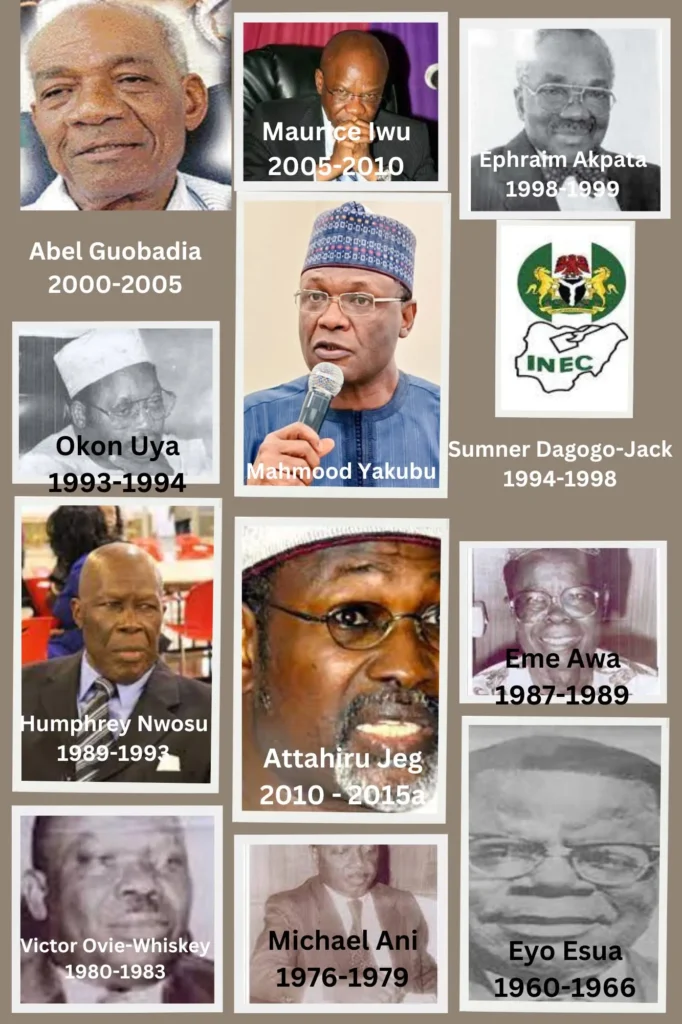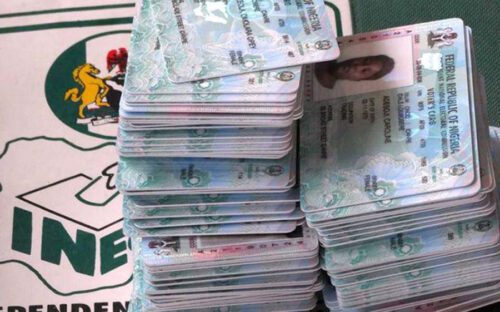The first chairman of Nigeria’s electoral body was Eyo Esua. At the time of updating this article, Mahmood Yakubu is the longest-serving INEC chairman.
There was the Electoral Commission of Nigeria that conducted the 1959 elections. After independence, the Federal Electoral Commission (FEDECO) came into being to conduct the federal and regional elections of 1964 and 1965.
This means that the origin of what is now known as the Independent National Electoral Commission (INEC) dates back to pre-independence.
Having said that see below the full list of INEC chairmen from 1960 to date

Eyo Esua
- Tenure: 1960-1966
- Electoral body: FEDECO
He’s the first chairman of the electoral body in Nigeria. At the time of his appointment, it is known as the Nigeria Federal Electoral Commission.
He was the chairman from 1960 till 1966 when Nigerian soldiers revolted and took overthrew the government through a coup de’tat.
Michael Ani
- Tenure: 1976-1979
- Body: FEC
After the government of Gen Murtala Muhammed and Gen Olusegun Obasanjo planned to hand over to a democratically elected government, Obasanjo, after the demise of his boss established came up with the Federal Electoral Commission (FEC) and appointed Chief Ani as the head to oversee the conduct of the 1979 elections.
Victor Ovie-Whiskey
- Tenure: 1980-1983
- Body: FEC
The government of Alhaji Shehu Shagari who was seeking reelection appointed Ovie-Whiskey to conduct the 1983 elections, unfortunately, the republic was truncated on December 31, 1983.
On assumption of office, the government of Gen. Muhammadu Buhari dissolves the electoral body.
Eme Awa
- tenure: 1987-1989
- Body: NEC
Gen Ibrahim Babangida overthrew the government of Buhari in 1985 and tried to return the country to a democratic government, thereby appointing Prof. Awa as the head of the National Electoral Commission of Nigeria.
Humphrey Nwosu
- Tenure: 1989-1993
- Body: National Electoral Commission of Nigeria (NEC)
Nwosu conducted an election that has been described as the freest and fairest election in Nigeria.
The election produced Chief M.K.O Abiola of the Social Democratic Party (SDP) as elected Nigerian president. Unfortunately, the election was annulled by the military head state IBB.
Prof.Okon Uya
- Tenure: 1993-1994
- Body: National Electoral Commission of Nigeria
He was summarily appointed by Ibrahim Babangida after annulling the 1993 presidential elections
Sumner Dagogo-Jack
- Tenure: 1994-1998
- Body: NECON
He was in charge of the National Electoral Commission of Nigeria (NECON) created by the regime of late Gen. Sani Abacha, NECON conducted elections for Abacha, who was trying to transform himself into a democratically elected head of state.
All the five political parties at the time had nominated him. The elected persons never assumed office before the sudden death of Abacha in June 1998.
Ephraim Akpata
- Tenure: 1998-1999
- Body: INEC
In 1998 General Abdulsalam Abubakar’s Administration dissolved NECON and came up with the Independent National Electoral Commission (INEC) which organized the transitional elections that ushered in the Nigerian Fourth Republic on May 29, 1999. Obasanjo won the election that year.
Abel Guobadia
- Tenure: 2000-2005
- Body: INEC
The regime of Chief Olusegun Obasanjo appointed Guobadia as the head of INEC and conducted the elections of 2003. Obasanjo won the election back to back.
Prof. Maurice Iwu
- Tenure: 2005-2010
- Body: INEC
In June 2005, Guobadia retired and was succeeded by Professor Maurice Iwu, who has been described as one of the most controversial INEC heads since 1999 till date.
During his reign as INEC boss, he announced that foreign monitors would not be allowed during elections, but only foreign election observers.
Iwu conducted the 2007 elections that brought in the Late Alhaji Shehu Musa YarÁdua, who confessed that the election that brought him to government was not free and fair.
Prof. Attahiru Jega
- Tenure: 2010-2015
- Body: INEC
He assumed office on June 8, 2010, he was appointed by President Goodluck Jonathan subject to Senate confirmation.
He conducted the 2011 election, in which the incumbent president Jonathan lost to the opposition, Muhammadu Buhari.
A week before the election which was earlier scheduled to hold on February 14, Jega announced the postponement of the election to March 28, citing security concerns.
Announcing the postponement, Jega said in a press conference:
“The commission cannot lightly wave off the advice of the nation’s security chiefs … The risk of deploying young men and women and calling people to exercise their democratic rights in a situation where their security cannot be guaranteed is a most onerous responsibility,” Independent National Electoral Commission (INEC) chairman Attahiru Jega told reporters.
“Consequently the commission has decided to reschedule the elections thus. The national elections, i.e. presidential and national assembly, are to hold on March 28, 2015; governorship and state assembly elections are to hold on April 11, 2015.”
Mahmood Yakubu
- Assumption of office: 2015-present
- Body: INEC
It’s on record that he postponed the 2019 General Elections six hours before the commencement of the polls.
“Following a careful review of the implementation of its logistics and operational plans and its determination to conduct free, fair and credible elections, the commission came to the conclusion that proceeding with the election as scheduled is no longer feasible.”
BBC quoted him as saying
Prof. Mahmood is also the INEC chairman who will oversee the conduct of the 2023 general elections across Nigeria.
From the list above, INEC chairmen from 1999 till date are:
- Ephraim Akpata
- Abel Guobadia
- Maurice Iwu
- Prof. Attahiru Jega
- Mahmood Yakubu (incumbent)


